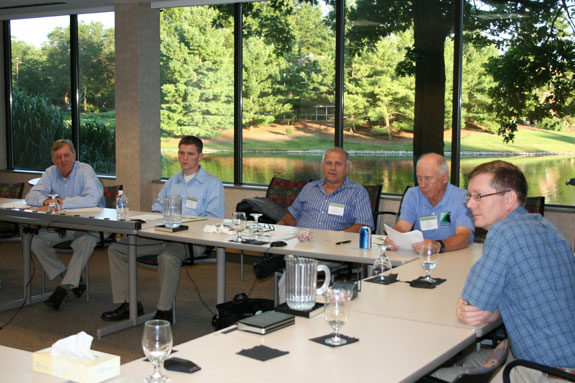The National Alfalfa & Forage Alliance and the National Corn Growers Association hosted Alfalfa/Corn Rotations for Sustainable Cellulosic Biofuels Production in Johnston, Iowa, on June 29-30 at Pioneer’s Carver Center.
Forage and corn agronomists from universities across the Midwest, researchers from USDA’s Agricultural Research Service, industry representatives, and producers gathered to take in presentations from some of the foremost experts in agronomy and biofuels production who extolled the advantages an alfalfa/corn rotation has as a biofuel production system.
“It seems as though alfalfa is treated as the ‘red-headed step child’ when it comes to cellulosic biofuel feedstocks,” said Beth Nelson, President of the National Alfalfa & Forage Alliance.
“We’re demonstrating that not only does alfalfa make an attractive option as a cellulosic biofuel feedstock, but actually provides many advantages over some of the other options being widely discussed.”
As a cellulosic biofuel feedstock, the alfalfa/corn rotation has inherent advantages. Alfalfa is widely grown throughout the U.S. corn belt, prevents erosion, provides a yield boost to corn, and provides the following year’s corn crop with all of its nitrogen needs.
Additionally, the leaves can be fractioned and used as a high protein feed source, while the remaining stems can be used to produce cellulosic ethanol, diminishing the primary concern of many about diverting grain from food and feed uses for bioenergy production.

The program featured USDA and university researchers who discussed the agronomic, economic, and mechanical considerations of alfalfa/corn production systems, as well as the areas where further research is needed.
The Ethanol Producer/Enzyme Panel discussion that followed featured representatives from Poet, Abengoa, ADM, and Genencor discussing their current activities and future plans as it relates to cellulosic ethanol production.
The evening was capped off with working groups which were tasked with addressing issues in five different topic areas including agronomic, environmental, conversion, logistics, and economics and policy.
The event’s featured speaker, Dr. Jeffrey Steiner, USDA-Agricultural Research Service National Program Leader for Biomass Production Systems, discussed USDA’s strategy for ‘Growing America’s Fuels’ and gave an overview of the Department’s strategy for meeting the Renewable Fuels Standard of producing 36 billion gallons of biofuels by 2022.
A Steering Committee of key industry and academic professionals was chosen at the conclusion of the meeting and will now focus its efforts on activities including developing an action plan and building on the momentum created by this event.
For those unable to attend the workshop but are interested in the presentations made, NAFA will be making a copy of the proceedings available on its website located at www.alfalfa.org.
Information and photos provided by the National Alfalfa & Forage Alliance










